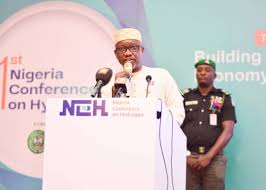FG Reaffirms Commitment to Solving Nigeria’s Energy Crisis

By Faridat Salifu
The federal government has reiterated its commitment to addressing Nigeria’s persistent energy challenges by focusing on collaborative efforts between the public and private sectors.
Minister of Power, Mr. Adebayo Adelabu, made this known on at the Rural Electrification Agency (REA) workshop held recently in Abuja.
The workshop, themed “Powering Partnership for Sustainable Energy Access and Innovation”, brought together key stakeholders to explore solutions for Nigeria’s energy needs.
Adelabu, represented by Dr. Owolabi Sunday, Director of Renewable and Rural Power Access at the Ministry of Power, said that the government was working tirelessly to overcome the country’s energy challenges, which continue to affect both on-grid and off-grid electricity access.
He assured that the concerted efforts being made would soon yield the much-needed improvements to the sector.
“Since we assumed office, we have been actively addressing these challenges, transforming them into opportunities for growth,” Adelabu said, as he called for increased collaboration across all levels of government and the private sector to drive sustainable energy access.
The minister spoke about the launch of the Distributed Access through Renewable Energy Scale-up (DARES) programme, supported by a $750 million commitment from the World Bank.
The project, he said aims to provide energy access to over 13 million Nigerians and is expected to play a key role in improving power infrastructure across the country.
Adelabu also introduced the e-H.E.A.R.T initiative, designed to sustainably energize key sectors, including healthcare, education, agriculture, rural communities, and transportation.
This initiative, he said, is part of a broader strategy to expand energy access while transitioning Nigeria to a low-carbon economy.
He stressed that achieving universal energy access by 2030, in line with the United Nations’ Sustainable Development Goal 7 (SDG 7), would require a shift towards innovative and scalable energy solutions.
Earlier, the Managing Director of the REA, Abba Aliyu, highlighted the importance of public-private collaboration in tackling Nigeria’s electricity challenges.
He pointed out that for the first time in Nigeria’s history, the entire electricity value chain has been liberalized, allowing subnational governments and private players to take on greater roles in electrification projects.
Aliyu also welcomed the $750 million funding commitment for the DARES programme, noting that it marks a significant turning point for private sector involvement in the energy sector. He encouraged the private sector to seize the opportunity to deploy renewable energy infrastructure in rural communities, where electrification efforts are most needed.
“The private sector’s wait is over; the opportunities are now open. I urge them to engage with the REA, take advantage of the available capital grants, and help bring electricity to Nigeria’s underserved regions,” Aliyu said.
With over 124 mini-grids deployed through the Rural Electrification Fund (REF), Aliyu pointed out the successful installation of a mini-grid in a community within the Abuja metropolitan area, as one of the agency’s notable achievements.
He also called on state governments to leverage the Electrification Act and create an enabling environment for private sector investment in energy infrastructure.
